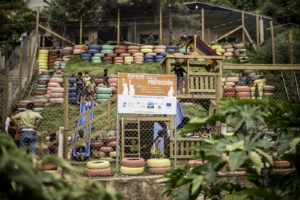5 Facts About Organized Crime in the Northern Triangle

Two previously published articles on The Borgen Project’s website have mentioned the issues of violence, poverty and corruption in the Northern Triangle of Central America (NTCA). This article’s focus is on the organized crime in the northern triangle that engenders the violence and corruption, which includes street gangs, drug cartels and paramilitary organizations. Daily life in the NTCA is rife with immediate danger from many different sources.
5 Facts About Organized Crime in the Northern Triangle
- Gangs’ Influence: Gangs are a part of daily life, particularly for urban residents in the cities of the Northern Triangle. Gangs control swaths of city territory and young children must learn the boundaries from an early age—or risk being harassed, kidnapped, or even killed. In the Honduran capital of Tegucigalpa, gang violence is so common that the residents have adapted to it. Fortunately, there are local organizations (along with the help of foreign humanitarian aid) that are working to provide children with safe places where they can play without having to worry about crossing gang borders.
- Hard National Borders Exaberates Gang Activity: During the late 1970s and throughout the 1980s, the Northern Triangle became a focus of U.S. Policy—not for aid, but as a theater of operations in the War on Drugs. This led to a tightening of both the U.S. and Mexico’s southern border. Lack of adequate protection in Mexico and the U.S. put Northern Triangle migrants at risk of violence from paramilitaries and cartels, and detention and deportation from local authorities. Detention comes with its own set of health and safety risks, and deportation is tantamount to a death sentence for many migrants that were fleeing violence in the first place.
- Majority of Refugees Fleeing the Northern Triangle are Women and Children: Although there are several factors contributing to the surge of refugees coming from the NTCA, the two main ones are systemic poverty and the threat of gang violence. Many citizens of Northern Triangle countries live on less than $1.90 per day, making them extremely vulnerable to extortion from gangs which pose the threat of sexual violence and even death. In some cases, poverty leads to desperation for young men, prompting them to voluntarily join gangs for day-to-day security.
- Violence and Organized Crime in the Northern Triangle: In the last two decades of the 20th century, both Guatemala and El Salvador experienced violent civil wars that resulted in a major shakeup of the entire states’ power structures. Honduras itself was not involved in a civil conflict but the southern regions of the country were used as staging areas for the Nicaraguan contras during their rebellion against the Sandinista government in the 1980s. The end of the military conflicts instead led to a surge in criminal violence, with large numbers of armed and unemployed men forming their own paramilitary organizations, or finding work with street gangs and drug cartels.
- U.S. Deportations are a Direct Contributor to the Problem: While gang violence (both domestic and foreign) has been a consideration for the U.S. government for some decades now, methods differ on how to address it. U.S. Immigration and Customs Enforcement (ICE) usually deport any immigrant that commits a crime on U.S. soil, even if the deportee was not a member of a gang before deportation. This means they have limited recourse upon return to their home countries for reintegration, and tracking deportees after their return is difficult without information sharing. The lack of shared information is something that entities such as USAID and the State Department are hoping to address, via NGOs and independent commissions.
Organized crime in the Northern Triangle is one of the biggest obstacles to promoting stability and welfare in the region, exacerbated by many political and economic factors—the largest being the influence of international gangs. Corruption also enables many of the organized crime entities to operate with impunity, which in turn forces immigrants northward to flee threats of violence, extortion and forced recruitment. However, other articles have touched upon growing international visibility of the corruption—and efforts to fight it—in the Northern Triangle, and the spotlight on corruption has revealed the full extent of these gangs’ power and influence over the region.
In addition, U.S. Congress has introduced legislation targeted at addressing the root causes of migration from the NTCA which includes the threat of gang violence and organized crime. One such bill, the United States-Northern Triangle Enhanced Engagement Act already passed in the House of Representatives in July 2019. Click here to encourage your Senators to support this bill when it is introduced in the Senate.
– Rob Sprankle
Photo: Flickr
